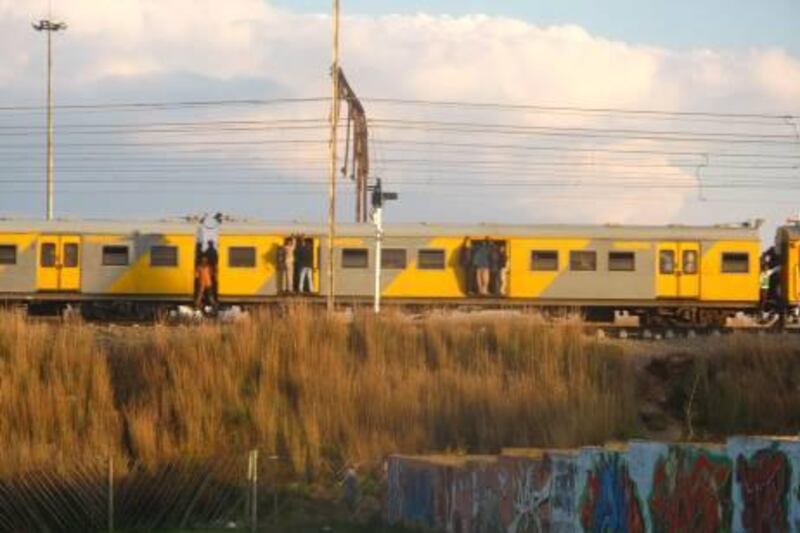"Do you have Mace?" - one of the last things my South African host said as he dropped me off at the train station in Cape Town to catch the 26-hour train to Johannesburg. For many South Africans, taking the train is akin to signing your own death warrant. Truth be told, it's more like riding the Amtrak in the US.
My next overnight stop is Soweto, the Jo'burg township where I plan to sleep for a night before moving on to Bulawayo, Zimbabwe's second largest city, en route overland to Victoria Falls and, eventually, Dar es Salaam, Tanzania. It's a long journey over 10 days - an extra leg of travel, an epilogue of sorts, since my destination was supposed to be Cape Town. But an easy epilogue of paved roads and well-trafficked bus routes compared to the travails of west and central Africa.
The name Soweto puts a certain music in my head. A simple acronym for South-west Township, Soweto was the epicentre of South Africa's apartheid struggle. For me, it echoes the first things I ever knew about South Africa as an American high school student at the end of the 1980s. Like today, the world jerked and twitched with the promise of democratic revolution. I think of The Indestructible Beat of Soweto and other records I read about but never owned. I think of Bono's Rattle and Hum speeches and Diamonds on the Soles of Her Shoes and strident teenage do-gooders writing letters for Amnesty International. If I'm going to pass though Jo'burg, I'd like to at least say I stuck an ear to Soweto's ground.
A city-within-a-city of many millions, today's Soweto is no uniform shanty-town sprawl. The part I'm heading to, Orlando West, is a middle-class neighbourhood with playgrounds, fences and solid single-storey homes. It's also home to Lebo's Soweto Backpackers, a Fair Trade accredited hostel that offers bicycle tours of the township and community-based projects that should make you feel good about being a tourist.
I phone Lebo's from the train to make sure there's space. "What's the best way to get there from the station?" I ask through a muddled connection. The receptionist offers a pick-up, which I turn down.
"Is it safe to get there by a mini-bus taxi?"
A garbled voice replies: "Go to Bree taxi rank and ask for a mini-bus taxi to either Meadowlands or Phefeni via BOS. Get off at BOS and call us from there. Somebody will come to get you." She has to repeat and spell the proper names several times, and even then I only get a portion. "Just go to Bree taxi rank and call us from there," she says.
The train pulls into the station three hours late. Welcome to Jo'burg, hub of southern Africa, the continent's third-largest city after Cairo and Lagos, teeming with immigrants and home to every African nationalist. Guide-book descriptions of the multi-culti hub of southern Africa are tempered by warnings of violent crime, with areas of the city centre described as "no-go". As for the taxi ranks near the station, they say these should be approached with caution, if at all.
At the station's information desk, they shake their head with disbelief when I try to clarify the directions. "You need to know which zone of Meadowlands," the woman tut-tuts. "Otherwise you'll get lost." Plus, they direct me to a different taxi rank. Better luck is had at the Greyhound desk, where I'm to buy an onward ticket to Zimbabwe. The man at the counter doesn't know the areas named, but a woman in the back office overhears, emerges and says: "I know exactly where you want to go."
"You know Soweto Backpackers?" I ask. "I know exactly where you want to go," she repeats. "You get off at BOS, and everybody knows where that place is. You go buy your ticket, and then this man will take you to the taxi rank and put you on the right mini-bus." She points to a man named Stanley whose front teeth are missing.
Stanley guides me out of the station into the throngs on the street. He turns down a ramp into what looks like an empty parking garage. I'd be nervous, but I've put my trust in the Greyhound lady. The garage, it turns out, is the taxi rank. I board the last seat on the mini-bus, which soon crawls out of the city to the south-west. Unfortunately, the driver fails to alert me to the BOS stop - I never do find out what BOS stands for - and by the time I reach Lebo's, there's only about 30 minutes of daylight left. It's enough time to snap some pictures of children on the football pitch and the adjacent railway tracks.
My next ride to Bulawayo leaves at 8am. I have to leave before dawn to reach the bus station in time. I can say I slept in Soweto. That's all. Except one small thing, so consistent with the music in my head that even now I struggle to believe I wasn't imagining it. As the sun sets on the football game, a local metro train passes. Sadly, these trains, according to all accounts I've read, are genuinely riddled with crime. This one's as packed as Mumbai's second-class commuter rail at rush hour, with people hanging out of the open doors and straddling the spaces between the cars.
From a distance, I hear voices coming from the train. Or, rather, voices in unison, a resonant chorus of a cappella melody. The passengers are literally singing their way through Soweto.
Scott MacMillan is blogging about his journey on his website www.wanderingsavage.com





